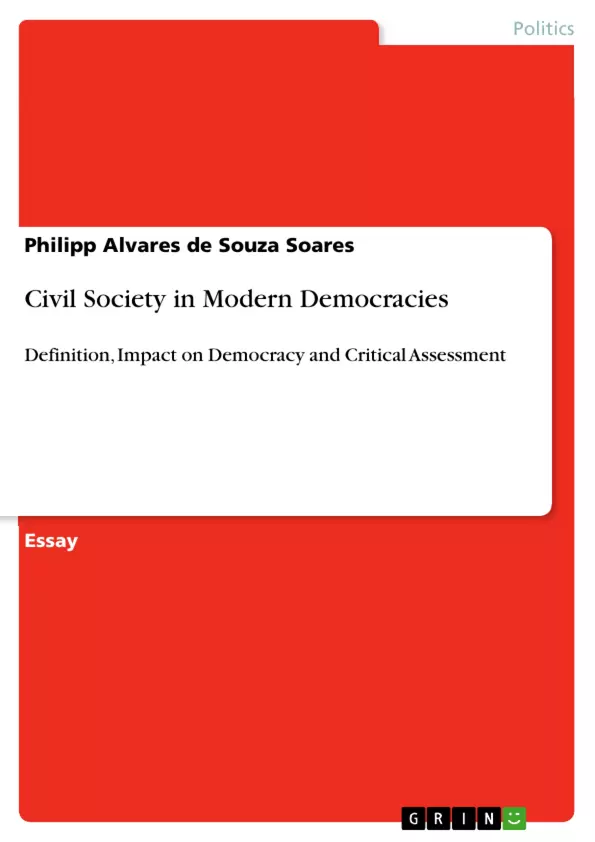The concept of civil society is a controversial and recently often discussed topic in the social sciences. Especially since the end of the socialist regimes in Eastern Europe, in which civil society organizations played an important role, it has been considered as a possible solution for many problems of modern societies and was in the focus of public discussion.
This essay tries to find a definition for civil society in its first part and continues by talking about the proclaimed role of it in modern democracies. Several theoretical approaches will be outlined. The already mentioned positive influences will be discussed as well as critically assessed. Afterwards the essay ends with a final conclusion.
Inhaltsverzeichnis (Table of Contents)
- 1. Introduction
- 2. Definition
- 3. Civil Society and Democracy
- 4. Critical Assessment
Zielsetzung und Themenschwerpunkte (Objectives and Key Themes)
This essay aims to define civil society and explore its role in modern democracies. It examines the positive influences attributed to civil society, while also offering a critical assessment. The essay concludes with a summary of its findings.
- Definition and conceptualization of civil society
- The relationship between civil society and democracy
- The role of civil society in addressing societal problems
- Critical assessment of civil society's impact
- Civil society's contribution to democratic participation
Zusammenfassung der Kapitel (Chapter Summaries)
- Chapter 1: Introduction This chapter introduces the concept of civil society as a controversial yet frequently discussed topic in social sciences, particularly since the fall of socialist regimes in Eastern Europe. It outlines the essay's structure and objectives.
- Chapter 2: Definition This chapter explores the difficulties in defining civil society due to its varied applications. It presents several definitions, highlighting the distinction between the state, private sector, and civil society as a "third sector" characterized by voluntary organizations and NGOs working for the common good.
- Chapter 3: Civil Society and Democracy This chapter examines civil society's role as a "school of democracy," fostering civic engagement and participation. It discusses how civil society provides a voice for underrepresented groups, offers expert advice to governments, and addresses issues neglected by state bodies. The chapter also highlights the positive effects of civil society on democratic participation and social capital, referencing Putnam's work. It further explores civil society's role in mitigating the negative impacts of globalization and fostering democratic culture, particularly in regions experiencing democratic deficits.
Schlüsselwörter (Keywords)
Civil society, democracy, civic engagement, NGOs, social capital, democratic participation, globalization, voluntary organizations, political participation, societal problems.
Frequently Asked Questions
How is "Civil Society" defined in this essay?
Civil society is often defined as a "third sector" consisting of voluntary organizations and NGOs, distinct from the state and the private market.
Why did civil society gain importance after the fall of socialist regimes?
Civil society organizations played a crucial role in the transition to democracy in Eastern Europe, highlighting their potential to solve societal problems.
What does the term "school of democracy" mean?
It refers to civil society's role in fostering civic engagement, teaching democratic participation, and building social capital.
What is the role of NGOs in modern democracies?
NGOs provide a voice for underrepresented groups, offer expert advice to governments, and address issues neglected by the state.
How does civil society relate to globalization?
It can mitigate the negative impacts of globalization by fostering a democratic culture and protecting local interests.
- Quote paper
- Philipp Alvares de Souza Soares (Author), 2009, Civil Society in Modern Democracies, Munich, GRIN Verlag, https://www.grin.com/document/122483



